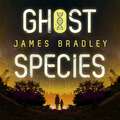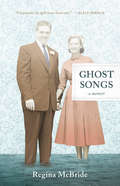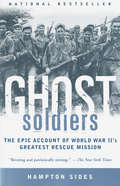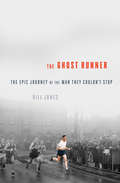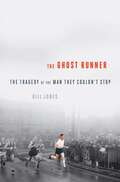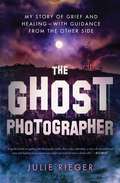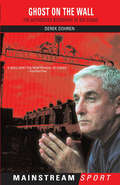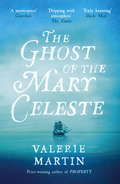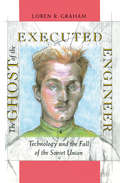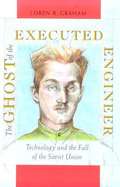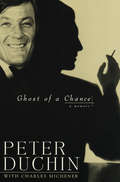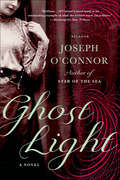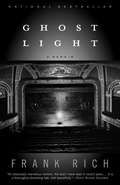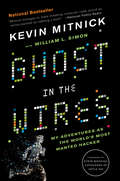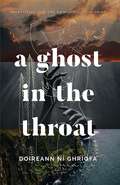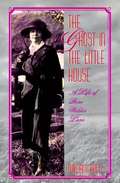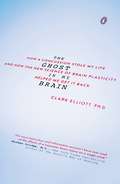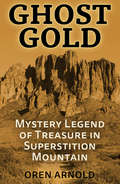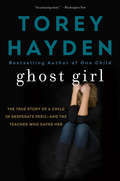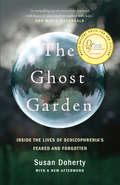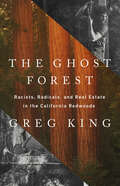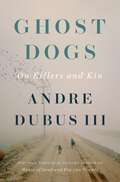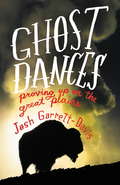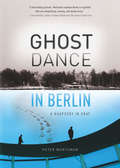- Table View
- List View
Ghost Species: The environmental thriller longlisted for the BSFA Best Novel Award
by James BradleyAs humanity faces the urgency of climate crisis, it is hubris versus hope when Kate Larkin joins a secret project to save the world by resurrecting a ghost species, the Neanderthals. But when the child Eve is born, Kate's role as scientist, and mother, forces her to ask what really makes us, and Eve, human?In an intimate portrayal of high-concept big ideas, can we engineer ourselves out of a problem of our own making? Set against the backdrop of rapidly approaching climate catastrophe, scientists Kate Larkin and Jay Gunesekera are recruited by tech billionaire and mogul Davis Hucken to the forests of Tasmania, Australia. His Foundation's mission is not only halting the effects of climate change, but to re-engineer and reverse the damage through the ambitious process of reviving species lost to the earth over time through natural and unnatural means. Including a clandestine ambition to resurrect the Neanderthals. When Eve, the first child, is born and grows up in a world crumbling around her, questions arise that her and Kate must face. Is she human or not, real or unnatural, and is she the ghost species or are we? As more and more of us are waking up to the truth about our climate, and our need to reverse the damage we have caused, James Bradley's novel is incredibly timely, poignant and reflective on what it means to be human on a personal and a global scale.(P) 2020 Penguin Random House Australia Audio
Ghost Songs
by Regina McbrideEighteen-year-old Regina McBride is haunted by the ghosts of her parents. Her father visits her--he is desperate, but she doesn't know how to help him. Her mother is a quiet figure, obscured by light--a flash at the foot of the bed. Regina, raised Irish Catholic and with the ironclad belief that some sins are unforgivable, fears her parents are trapped between worlds, forever punished after they committed suicide within a few months of each other. Terrorized by these visitations and flattened by grief, Regina slowly begins her hazardous journey to recovery. Lyrical and lovely, harrowing and haunting, Ghost Songs charts her struggle to separate madness from imagination and sorrow from devastation. From New York to the desert of New Mexico to the shores of Ireland, Regina searches for herself, her home, and a way to return to the family that remains. Ghost Songs is an exploration of memory, a meditation on love and loss, and, in the end, a celebration of life and the living.
Ghost Soldiers: The Epic Account of World War II's Greatest Rescue Mission
by Hampton SidesNATIONAL BESTSELLER • &“The greatest World War II story never told&” (Esquire)—an enthralling account of the heroic mission to rescue the last survivors of the Bataan Death March—from the author of Blood and Thunder. On January 28, 1945, 121 hand-selected U.S. troops slipped behind enemy lines in the Philippines. Their mission: March thirty rugged miles to rescue 513 POWs languishing in a hellish camp, among them the last survivors of the infamous Bataan Death March. A recent prison massacre by Japanese soldiers elsewhere in the Philippines made the stakes impossibly high and left little time to plan the complex operation. In Ghost Soldiers Hampton Sides vividly re-creates this daring raid, offering a minute-by-minute narration that unfolds alongside intimate portraits of the prisoners and their lives in the camp. Sides shows how the POWs banded together to survive, defying the Japanese authorities even as they endured starvation, tropical diseases, and torture. Harrowing, poignant, and inspiring, Ghost Soldiers is the mesmerizing story of a remarkable mission. It is also a testament to the human spirit, an account of enormous bravery and self-sacrifice amid the most trying conditions.
The Ghost Runner: The Epic Journey of the Man They Couldn't Stop
by Bill JonesA cross between Once a Runner and Chariots of Fire, the heartbreaking story of the man known as "The Ghost Runner."The mystery man threw off his disguise and started to run. Furious stewards gave chase. The crowd roared. A legend was born. Soon the world would know him as "the ghost runner," John Tarrant, the extraordinary man whom nobody could stop. As a hapless teenage boxer in the 1950s, he'd been paid £17 expenses. When he wanted to run, he was banned for life. His amateur status had been compromised. Forever. Now he was fighting back, gate-crashing races all over Britain. No number on his shirt. No friends in high places. Soon he would be a record-breaker, one of the greatest long-distance runners the world had ever seen.
The Ghost Runner: The Epic Journey Of The Man They Couldn't Stop
by Bill JonesThe incredible, inspiring, and heartbreaking story of a phenomenal long-distance runner&’s race against insurmountable odds and his own demons. The mystery man threw off his disguise and started to run. Furious stewards gave chase. The crowd roared. A legend was born. Soon the world would know him as "The Ghost Runner," John Tarrant, the extraordinary man whom nobody could stop. As a hapless teenage boxer in the 1950s, he'd been paid 17 pounds in expenses. When he turned to distance running, he found himself banned for life. His amateur status had been compromised. Forever. Now he was fighting back, gate-crashing races all over Britain. No number on his shirt. No friends in high places. Soon he would be a record-breaker, one of the greatest long-distance runners the world had ever seen. This is his story.
The Ghost Photographer: A Hollywood Executive's True Story of Discovering the Real World of Make-Believe
by Julie RiegerThis inspirational memoir, told with uncensored Southern wit and guidance, recounts the story of a Hollywood film executive who journeys through the cosmic wilderness and, against all odds, discovers psychic superpowers that radically transform her life. As a senior executive at one of the world’s largest movie studios, Julie Rieger spent her days marketing the imaginary stories of ghosts, faeries, superheroes, aliens, and more fantastical creatures. But after the devastating loss of her mother, the world of make-believe became reality when Julie captured her first ghost in a photograph and blew open a door to the Other Side. The Ghost Photographer chronicles Julie’s wild ride down the spiritual rabbit hole. After a series of unexpected, mind-blowing, and sometimes frightening encounters with the spirit realm, Julie was forced to face this strange awakening, flying in the face of scientific dogma and her own die-hard skepticism. Ultimately, she discovered that what she thought she had lost with the death of her mother—unconditional love—was in fact the greatest superpower one can wield. In a refreshing departure from traditional supernatural tales, Julie tells her story with bold humor and total candor. Her journey juxtaposes her down-home roots in rural America with the glam of Hollywood and her professional universe of hard, empirical data. As she fine-tunes her psychic abilities and comes to terms with the transformative power of grief, Julie is empowered to fearlessly tell her story, teach others, and invite them to share their own experiences of the paranormal and unexplained. She offers insights into our relationship with the spirit world, prayers and rituals for cleansing and protecting our homes from unwanted ghosts, and guidance on how to develop our intuition and sixth sense.
Ghost on the Wall: The Authorised Biography of Roy Evans
by Derek DohrenGhost on the Wall is the official biography of one of Liverpool Football Club's greatest ever servants: Roy Evans. Born in Bootle in 1948, Evans attracted the attention of many First Division club managers while playing for England's schoolboys team in the early 1960s. In 1964, legendary Liverpool manager Bill Shankly stepped in to sign him. But while the '60s were an exciting time to play for Liverpool, they were also very challenging, and Evans found it hard to break into the first team on a regular basis.Following Shankly's shock resignation in 1974, Evans was given the opportunity to become a member of the backroom staff. It was here that he really made his mark, taking the reserve team to seven Central League titles in nine years and coming of age as a coach and trainer, emerging as an invaluable member of the legendary 'Boot Room'.The decline in the club's fortunes during the 1980s meant that the resignation of manager Graeme Souness in 1994 left the incoming manager facing an exciting challenge - to return the club to its glory days. Roy Evans, 'the last of the Shankly lads', was handed his date with destiny. While the Reds did not win another League Championship under Evans' charge, neither did they finish any lower than fourth, and Evans' commitment to developing future Liverpool stars such as Robbie Fowler, Steve McManaman and Michael Owen ensured that he would not become another 'ghost on the wall' at Anfield.In this engrossing account, Evans reveals the inside story of life as a member of Liverpool's famous Boot Room. He recollects his close working relationships with Reds legends from Shankly to Houllier and provides a vivid portrait of operations at the celebrated club over four action-packed decades.Finally, he discusses the challenges he faces in his new role as assistant manager of the Welsh national side and considers the way forward for Liverpool after their Champions League victory under Rafael Benítez in 2005.
The Ghost of the Mary Celeste (Vintage Contemporaries Ser.)
by Valerie MartinFrom the ORANGE PRIZE-winning author, an enthralling novel about an enduring mystery, an infamous mystic and Arthur Conan Doyle.
The Ghost of the Executed Engineer: Technology and the Fall of the Soviet Union (Russian Research Center studies ; #No. 87)
by Loren GrahamStalin ordered his execution, but here Peter Palchinsky has the last word. As if rising from an uneasy grave, Palchinsky’s ghost leads us through the miasma of Soviet technology and industry, pointing out the mistakes he condemned in his time, the corruption and collapse he predicted, the ultimate price paid for silencing those who were not afraid to speak out. The story of this visionary engineer’s life and work, as Loren Graham relates it, is also the story of the Soviet Union’s industrial promise and failure. We meet Palchinsky in pre-Revolutionary Russia, immersed in protests against the miserable lot of laborers in the tsarist state, protests destined to echo ironically during the Soviet worker’s paradise. Exiled from the country, pardoned and welcomed back at the outbreak of World War I, the engineer joined the ranks of the Revolutionary government, only to find it no more open to criticism than the previous regime. His turbulent career offers us a window on debates over industrialization. Graham highlights the harsh irrationalities built into the Soviet system—the world’s most inefficient steel mill in Magnitogorsk, the gigantic and ill-conceived hydroelectric plant on the Dnieper River, the infamously cruel and mislocated construction of the White Sea Canal. Time and again, we see the effects of policies that ignore not only the workers’ and consumers’ needs but also sound management and engineering precepts. And we see Palchinsky’s criticism and advice, persistently given, consistently ignored, continue to haunt the Soviet Union right up to its dissolution in 1991. The story of a man whose gifts and character set him in the path of history, The Ghost of the Executed Engineer is also a cautionary tale about the fate of an engineering that disregards social and human issues.
The Ghost of the Executed Engineer: Technology and the Fall of the Soviet Union (Russian Research Center Studies #87)
by Loren R. GrahamStalin ordered his execution, but here Peter Palchinsky has the last word. Palchinsky tells of Soviet technology and industry, the mistakes he condemned in his lifetime, the corruption and collapse he predicted, the ultimate price paid for silencing those who were not afraid to speak out. The story of this visionary engineer's life and work, as Graham tells it, is also the story of the Soviet Union's industrial promise and failure.
Ghost of a Chance: A Memoir
by Peter Duchin Charles Michener“The story of [Peter] Duchin’s life has an elegiac aura of glamour and tragedy that might have come directly from the imagination of F. Scott Fitzgerald.”—The Philadelphia Inquirer “This book brings back marvelous memories of a very special time.”—Frank Sinatra Called “a living compendium of a hundred years of social history” by The New York Times Book Review, Peter Duchin has lived through tremendous highs and dismal lows. Orphaned by his glamorous parents, the Newport debutante Marjorie Oelrichs and the famous bandleader Eddy Duchin, he was raised in the privileged, old-money world of Averell Harriman, the diplomat and former governor of New York. He grew up to be one of America’s preeminent bandleaders, effortlessly entertaining and charming partygoers at thousands of society galas, from the White House to Truman Capote’s Black and White Ball. In Ghost of a Chance, he looks back on a life that another man may not have survived. And as he relates the frank, often surprising recollections of the many friends and famous figures who made up the strange family of his youth, Duchin chronicles the changing face of social life in America. Praise for Ghost of a Chance “A tale told with wit and charm . . . It is a sprightly, engaging, and at times hilarious look back at a life spent in music, show business, and what used to be called society.”—The Boston Globe“A bittersweet gem of a book.”—The Philadelphia Inquirer“Peter Duchin’s glamorous story is about absent fathers, surrogate mothers, and dwelling on the edges of money and power in a tuxedoed world.”—Gay Talese“A great read.”—Frank Sinatra
Ghost Light: A Novel
by Joseph O'Connor1907 Edwardian Dublin, a city of whispers and rumors. At the Abbey Theatre W. B. Yeats is working with the talented John Synge, his resident playwright. It is here that Synge, the author of The Playboy of the Western World and The Tinker's Wedding, will meet an actress still in her teens named Molly Allgood. Rebellious, irreverent, beautiful, flirtatious, Molly is a girl of the inner-city tenements, dreaming of stardom in America. Witty and watchful, she has dozens of admirers, but it is the damaged older playwright who is her secret passion despite the barriers of age, class, education, and religion.Synge is a troubled, reticent genius, the son of a once prosperous landowning family, a poet of fiery language and tempestuous passions. Yet his life is hampered by conventions and by the austere and God-fearing mother with whom he lives. Scarred by a childhood of immense loneliness and severity, he has long been ill, but he loves to walk the wild places of Ireland. The affair, sternly opposed by friends and family, is turbulent, sometimes cruel, and often tender. 1950s postwar London, an old woman walks across the city in the wake of a hurricane. As she wanders past bomb sites and through the forlorn beauty of wrecked terraces and wintry parks, her mind drifts in and out of the present as she remembers her life's great love, her once dazzling career, and her travels in America. Vivid and beautifully written, Molly's swirling, fractured narrative moves from Dublin to London via New York with luminous language and raw feeling. Ghost Light is a story of great sadness and joy—a tour de force from the widely acclaimed and bestselling author of Star of the Sea.
Ghost Light
by Frank RichThere is a superstition that if an emptied theater is ever left completely dark, a ghost will take up residence. To prevent this, a single "ghost light" is left burning at center stage after the audience and all of the actors and musicians have gone home. Frank Rich's eloquent and moving boyhood memoir reveals how theater itself became a ghost light and a beacon of security for a child finding his way in a tumultuous world. Rich grew up in the small-townish Washington, D.C., of the 1950s and early '60s, a place where conformity seemed the key to happiness for a young boy who always felt different. When Rich was seven years old, his parents separated--at a time when divorce was still tantamount to scandal--and thereafter he and his younger sister were labeled "children from a broken home." Bouncing from school to school and increasingly lonely, Rich became terrified of the dark and the uncertainty of his future. But there was one thing in his life that made him sublimely happy: the Broadway theater.Rich's parents were avid theatergoers, and in happier times they would listen to the brand-new recordings of South Pacific, Damn Yankees, and The Pajama Game over and over in their living room. When his mother's remarriage brought about turbulent changes, Rich took refuge in these same records, re-creating the shows in his imagination, scene by scene. He started collecting Playbills, studied fanatically the theater listings in The New York Times and Variety, and cut out ads to create his own miniature marquees. He never imagined that one day he would be the Times's chief theater critic.Eventually Rich found a second home at Wash-ington's National Theatre, where as a teenager he was a ticket-taker and was introduced not only to the backstage magic he had dreamed of for so long but to a real-life cast of charismatic and eccentric players who would become his mentors and friends. With humor and eloquence, Rich tells the triumphant story of how the aspirations of a stagestruck young boy became a lifeline, propelling him toward the itinerant family of theater, whose romantic denizens welcomed him into the colorful fringes of Broadway during its last glamorous era.Every once in a while, a grand spectacle comes along that introduces its audiences to characters and scenes that will resound in their memories long after the curtain has gone down. Ghost Light, Frank Rich's beautifully crafted childhood memoir, is just such an event.
Ghost Light: A Memoir
by Frank RichThere is a superstition that if an emptied theater is ever left completely dark, a ghost will take up residence. To prevent this, a single "ghost light" is left burning at center stage after the audience and all of the actors and musicians have gone home. Frank Rich's eloquent and moving boyhood memoir reveals how theater itself became a ghost light and a beacon of security for a child finding his way in a tumultuous world. Rich grew up in the small-townish Washington, D.C., of the 1950s and early '60s, a place where conformity seemed the key to happiness for a young boy who always felt different. When Rich was seven years old, his parents separated--at a time when divorce was still tantamount to scandal--and thereafter he and his younger sister were labeled "children from a broken home." Bouncing from school to school and increasingly lonely, Rich became terrified of the dark and the uncertainty of his future. But there was one thing in his life that made him sublimely happy: the Broadway theater. Rich's parents were avid theatergoers, and in happier times they would listen to the brand-new recordings of South Pacific, Damn Yankees, and The Pajama Game over and over in their living room. When his mother's remarriage brought about turbulent changes, Rich took refuge in these same records, re-creating the shows in his imagination, scene by scene. He started collecting Playbills, studied fanatically the theater listings in The New York Times and Variety, and cut out ads to create his own miniature marquees. He never imagined that one day he would be the Times's chief theater critic. Eventually Rich found a second home at Washington's National Theatre, where as a teenager he was a ticket-taker and was introduced not only to the backstage magic he had dreamed of for so long but to a real-life cast of charismatic and eccentric players who would become his mentors and friends. With humor and eloquence, Rich tells the triumphant story of how the aspirations of a stagestruck young boy became a lifeline, propelling him toward the itinerant family of theater, whose romantic denizens welcomed him into the colorful fringes of Broadway during its last glamorous era. Every once in a while, a grand spectacle comes along that introduces its audiences to characters and scenes that will resound in their memories long after the curtain has gone down. Ghost Light, Frank Rich's beautifully crafted childhood memoir, is just such an event.
Ghost in the Wires: My Adventures as the World's Most Wanted Hacker
by William L. Simon Kevin Mitnick Steve WozniakKevin Mitnick was the most elusive computer break-in artist in history. He accessed computers and networks at the world's biggest companies--and however fast the authorities were, Mitnick was faster, sprinting through phone switches, computer systems, and cellular networks. He spent years skipping through cyberspace, always three steps ahead and labeled unstoppable. But for Kevin, hacking wasn't just about technological feats-it was an old fashioned confidence game that required guile and deception to trick the unwitting out of valuable information.Driven by a powerful urge to accomplish the impossible, Mitnick bypassed security systems and blazed into major organizations including Motorola, Sun Microsystems, and Pacific Bell. But as the FBI's net began to tighten, Kevin went on the run, engaging in an increasingly sophisticated cat and mouse game that led through false identities, a host of cities, plenty of close shaves, and an ultimate showdown with the Feds, who would stop at nothing to bring him down. Ghost in the Wires is a thrilling true story of intrigue, suspense, and unbelievable escape, and a portrait of a visionary whose creativity, skills, and persistence forced the authorities to rethink the way they pursued him, inspiring ripples that brought permanent changes in the way people and companies protect their most sensitive information.
A Ghost in the Throat
by Doireann Ní GhríofaA New York Times Notable Book for 2021, this is a contemporary Irish poet's musings and obssession over a seventeenth-century poet's written keen on the murder of her husband. Themes include erasure of a people, of a language, of women; a meditation on motherhood and on translation; and an unforgettable story about finding your voice by freeing another's. The poem at issue is printed on both Gaelic with translation into modern English on pages 284 to 320 and was carefully proofread for accuracy. The Gaelic and English are shown on alternating even (Gaelic) and odd (English translation) pages respectively.
The Ghost in the Little House: A Life of Rose Wilder Lane
by William Holtz"The Little House books, attributed to Laura Ingalls Wilder, are indisputably brilliant classics of children's literature; but the singular attribution is shown to be in error in this meticulous biography of Laura's daughter Rose (1886-1966). Rose shaped every sentence of her mother's reminiscences, transforming rudimentary notes into eloquent books that exquisitely capture a child's perception of pioneer life and express hopes and aspirations at America's bedrock. Rose was an unconventional woman who wrote and travelled extensively and espoused passionately-held libertarian views; her story is fascinating, even without the startling revelation of her authorship." Annotation c. by Book News, Inc. , Portland, Or. Because of the time period in which Rose lived and because the author quotes extensively from her journals, diaries and correspondence, there is a great deal of U.S. and world history in this book, and descriptions of various countries and cities in which she traveled and lived at various times
The Ghost in My Brain: How a Concussion Stole My Life and How the New Science of Brain Plasticity Helped Me Get it Back
by Clark ElliottThe dramatic story of one man's recovery offers new hope to those suffering from concussions and other brain traumas In 1999, Clark Elliott suffered a concussion when his car was rear-ended. Overnight his life changed from that of a rising professor with a research career in artificial intelligence to a humbled man struggling to get through a single day. At times he couldn't walk across a room, or even name his five children. Doctors told him he would never fully recover. After eight years, the cognitive demands of his job, and of being a single parent, finally became more than he could manage. As a result of one final effort to recover, he crossed paths with two brilliant Chicago-area research-clinicians--one an optometrist emphasizing neurodevelopmental techniques, the other a cognitive psychologist--working on the leading edge of brain plasticity. Within weeks the ghost of who he had been started to re-emerge. Remarkably, Elliott kept detailed notes throughout his experience, from the moment of impact to the final stages of his recovery, astounding documentation that is the basis of this fascinating book. The Ghost in My Brain gives hope to the millions who suffer from head injuries each year, and provides a unique and informative window into the world's most complex computational device: the human brain.From the Hardcover edition.
Ghost Gold: Strange Mystery Legend Of Treasure In Superstition Mountain
by Oren ArnoldGhost Gold, first published in 1954, is the story of Arizona’s Superstition Mountain and the Lost Dutchman Mine, a legendary mine containing a rich gold deposit (whether or not the mine does in fact exist remains an unanswered question). In a fascinating look at the mine’s history, author Oren Arnold (1900-1980) recounts the known facts and legends about the exploration and ‘discovery’ of the mine and the fate of some its the notable personalities (such as the “Lost Dutchman” himself—Jakob Walz). Included are 8 pages of illustrations.Author Oren Arnold was an authority on the lore of the West and wrote more than 20 books and many magazine articles.
Ghost Girl: The True Story Of A Child In Desperate Peril - And A Teacher Who Saved Her
by Torey HaydenJadie never spoke. She never laughed, or cried, or uttered any sound. Despite efforts to reach her, Jadie remained locked in her own troubled world . . . until one remarkable teacher persuaded her to break her self-imposed silence.Nothing in all of Torey Hayden’s experience could have prepared her for the shock of what Jadie told her—a story too horrendous for Torey’s professional colleagues to acknowledge. Yet a little girl was living in a nightmare, and Torey responded in the only way she knew how—with courage, compassion, and dedication—demonstrating once again the tremendous power of love and the resilience of the human spirit.
The Ghost Garden: Inside the lives of schizophrenia's feared and forgotten
by Susan DohertyA rare work of narrative non-fiction that illuminates a world most of us try not to see: the daily lives of the severely mentally ill, who are medicated, marginalized, locked away and shunned.Susan Doherty's groundbreaking book brings us a population of lost souls, ill-served by society, feared, shunted from locked wards to rooming houses to the streets to jail and back again. For the past ten years, some of the people who cycle in and out of the severely ill wards of the Douglas Institute in Montreal, have found a friend in Susan, who volunteers on the ward, and then follows her friends out into the world as they struggle to get through their days. With their full cooperation, she brings us their stories, which challenge the ways we think about people with mental illness on every page. The spine of the book is the life of Caroline Evans (not her real name), a woman in her early sixties whom Susan has known since she was a bright and sunny school girl. Caroline had formed a close friendship with Susan and shared stories from her life; through her, we experience what living with schizophrenia over time is really like. She has been through it all, including the way the justice system treats the severely mentally ill: at one point, she believed that she could save her roommate from the devil by pouring boiling water into her ear... Susan interleaves Caroline's story with vignettes about her other friends, human stories that reveal their hopes, their circumstances, their personalities, their humanity. She's found that if she can hang in through the first ten to fifteen minutes of every coffee date with someone in the grip of psychosis, then true communication results. Their "madness" is not otherworldly: instead it tells us something about how they're surviving their lives and what they've been through. The Ghost Garden is not only touching, but carries a cargo of compassion and empathy.
The Ghost Forest: Racists, Radicals, and Real Estate in the California Redwoods
by Greg KingThe definitive story of the California redwoods, their discovery and their exploitation, as told by an activist who fought to protect their existence against those determined to cut them down. Every year millions of tourists from around the world visit California&’s famous redwoods. Yet few who strain their necks to glimpse the tops of the world&’s tallest trees understand how unlikely it is that these last isolated groves of giant trees still stand at all. In this gripping historical memoir, journalist and famed redwood activist Greg King examines how investors and a growing U.S. economy drove the timber industry to cut down all but 4 percent of the original two-million-acre redwood ecosystem. King first examined redwood logging in the 1980s—as an award-winning reporter. What he found in the woods convinced him to leap the line of neutrality and become an activist dedicated to saving the very last ancient redwood groves remaining in private hands. The land grab began in 1849, when a &“green gold rush&” of migrants came to exploit the legendary redwoods that grew along the Russian River. Several generations later, in 1987, Greg King discovered and named Headwaters Forest—at 3,000 acres the largest ancient redwood habitat remaining outside of parks—and he led the movement to save this grove. After a decade of one of the longest, most dramatic, and violent environmental campaigns in US history, in 1999 the state and federal governments protected Headwaters Forest. The Ghost Forest explores a central question, an overhanging mystery: What was it like, this botanical Elysium that grew only along the Northern California coast, a forest so spectacular—but also uniquely valuable as a cornerstone of American economic growth—that in the end it would inspire life-and-death struggles? Few but loggers and surveyors ever saw such magnificent trees, ancient sentinels that, like ghosts, have informed King&’s understanding of the world. On a lifelong journey, King finds himself through the generations, and through the trees.A Next Big Idea Club Must-Read Title
Ghost Dogs: On Killers and Kin
by Andre Dubus IIIFrom the literary master and best-selling author of Townie, reflections on a life of challenges, contradictions, and fulfillments. During childhood summers in Louisiana, Andre Dubus III’s grandfather taught him that men’s work is hard. As an adult, whether tracking down a drug lord in Mexico as a bounty hunter or grappling with privilege while living with a rich girlfriend in New York City, Dubus worked—at being a better worker and a better human being. In Ghost Dogs, Dubus’s nonfiction prowess is on full display in his retelling of his own successes, failures, triumphs, and pain. In his longest essay, “If I Owned a Gun,” Dubus reflects on the empowerment and shame he felt in keeping a gun, and his decision, ultimately, to give it up. Elsewhere, he writes of a violent youth and of settled domesticity and fatherhood, about the omnipresent expectations and contradictions of masculinity, about the things writers remember and those they forget. Drawing upon kindred literary spirits from Rilke to Rumi to Tim O’Brien, Ghost Dogs renders moments of personal revelation with emotional generosity and stylistic grace, ultimately standing as essential witness and testimony to the art of the essay.
Ghost Dances: Proving Up on the Great Plains
by Josh Garrett-DavisA gifted young writer takes a singular journey back to his native Midwestern American Plains. Growing up in South Dakota, Josh Garrett-Davis always knew he would leave. But as a young adult, he kept going back-in dreams and reality and by way of books. With this beautifully written narrative about a seemingly empty but actually rich and complex place, he has reclaimed his childhood, his unusual family-and the Great Plains.Among the subjects and people who bring his Plains to life are the destruction and resurgence of the American bison; his great-great-grandparents' twenty-year sojourn in Nebraska as homesteaders; Native American "Ghost Dancers," who attempted to ward off destruction by supernatural means before the 1890 massacre at Wounded Knee; the political allegory to be found in The Wizard of Oz; and current attempts by ecologists to "rewild" the Plains. GHOST DANCES is a fluid combination of memoir and history and reportage that reminds us that our roots matter-and might even be inspiring and fascinating.
Ghost Dance in Berlin
by Peter WortsmanEvery great city is a restless work in progress, but nowhere is the urban impulse more in flux than in Berlin, that sprawling metropolis located on the fault line of history. A short-lived fever-dream of modernity in the Roaring Twenties, redubbed Germania and primped up into the megalomaniac fantasy of a Thousand-Year Reichstadt in the Thirties, reduced in 1945 to a divided rubble heap, subsequently revived in a schizoid state of post-World War II duality, and reunited in 1989 when the wall came tumbling down - Berlin has since been reborn yet again as the hipster hub of the 21st century. This book is a hopscotch tour in time and space.Part memoir, part travelogue, Ghost Dance in Berlin is an unlikely declaration of love, as much to a place as to a state of mind, by the American-born son of German-speaking Jewish refugees. Peter Wortsman imagines the parallel celebratory haunting of two sets of ghosts, those of the exiled erstwhile owners, a Jewish banker and his family, and those of the Führer's Minister of Finance and his entourage, who took over title, while in another villa across the lake another gaggle of ghosts is busy planning the Final Solution.
